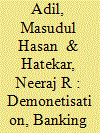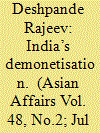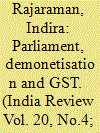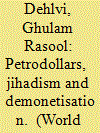| Srl | Item |
| 1 |
ID:
156888


|
|
|
| 2 |
ID:
153134


|
|
|
|
|
| Summary/Abstract |
The recent demonetisation in India is an issue of potentially wider relevance that requires further analysis. This brief article places the current evidence into a wider context, indicates how the process has been managed so far and then raises some searching questions concerning the role of the Indian state. Particularly, to what extent can this kind of measure be seen as evidence of responsible governance in the wider context of ‘Modinomics’, relating to claims that government should be less of a spender than an enabler? Wider elements of epistemology, asking how we know what we think we know about India’s black economy and informal sector are also gaining prominence in such endeavours.
|
|
|
|
|
|
|
|
|
|
|
|
|
|
|
|
| 3 |
ID:
172205


|
|
|
|
|
| Summary/Abstract |
This article seeks to advance contextualised understanding of the extent to which a cashless economy in India can be a feasible developmental goal. Initially, impressed with critiques of the sudden ‘demonetisation’ on 8 November 2016, we conducted econometric research to test how banks (‘bricks’) could be brought closer to rural people. However, this traditional approach of envisaging more banks was rapidly overtaken by the massive uptake of digital payment methods (‘clicks’) in India since 2016. Partly driven by the Reserve Bank of India (RBI), this has raised new concerns and research agenda focused on people’s trust in banking and new technologies, consumer skills and people’s basic rights vis-à-vis a state that, controversially, now seems to be seeking more control within a relentlessly changing postmodern scenario.
|
|
|
|
|
|
|
|
|
|
|
|
|
|
|
|
| 4 |
ID:
153004


|
|
|
|
|
| Summary/Abstract |
This article offers an account of the impact of Indian PM Narendra Modi’s decision in November 2016 to withdraw suddenly all Rs 500 and Rs 1000 notes from circulation in India with the avowed intent of combatting fraud, tax avoidance and other economic problems. The article assesses the impact from the demonetisation in November to the March 2017 Indian regional elections, where wide-scale victories for Modi’s political party, the BJP, appear to have vindicated his reforms. The article provides an analysis of the political background of the period, as well as looking at the economic and societal impact of the changes, including the way in which the behaviour of Indian citizens has been ‘nudged’ with particular regard to use of banking, transactions, social effects, and payment of tax.
|
|
|
|
|
|
|
|
|
|
|
|
|
|
|
|
| 5 |
ID:
180900


|
|
|
|
|
| Summary/Abstract |
This paper exploits the property of random selection of questions for answering in Parliament to analyze the party-wise share of questions submitted, normalized by seat share, at two major economic policy events during the term of the Sixteenth Lok Sabha (LS16) – demonetization on 8 November 2016, and the introduction of the Goods and Services Tax (GST) on 1 July 2017. Parties are grouped into three: the ruling party (BJP); allied parties in the ruling NDA coalition; and parties in opposition. The paper also charts the change over time in the types of questions asked, and mines the official responses for information not normally available through the usual channels.
|
|
|
|
|
|
|
|
|
|
|
|
|
|
|
|
| 6 |
ID:
154264


|
|
|
|
|
| Summary/Abstract |
Radical Islamism or jihadism funded by “petrodollars” plays a sinister role in supplying arms to militant Islamist groups around the world and terror financing has indeed become a matter of concern for strategic analysts, particularly those engaged with the monumental task of counterterrorism. In view of the deep-rooted fi nancing of terror in Kashmir, it was hoped that demonetisation would curb the sources of funding in the valley where the ilk of Hizb-ul-Mujahidin collect donations from Pakistan and then route them into the state through hawala operators. This article reviews the effects of the demonetisation process carried out by the Narendra Modi government in 2016 to wipe out black money and its use for terrorism. It concludes that demonetisation is not an effective measure against terrorism and the illicit economy.
|
|
|
|
|
|
|
|
|
|
|
|
|
|
|
|